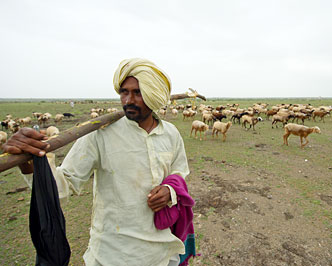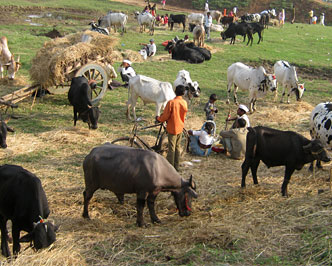-
- May 1, 2021
A Night Under the Stars
A Night Under the Stars
Living life like a nomad and actually being a nomad are two different things. I belong to one of the nomadic pastoralist communities of India – I am a Dhangar but I was born, raised and educated in a city. My immediate family had stopped herding animals a while ago although some distant relatives still herd sheep. My parents had left those roots to follow a different path so it was with mixed emotions that I visited the “wada” ( settlement) of the Khatal family as part of my Fellowship with Anthra .
Banubai Khatal is a Hatkar Dhangar from Dhawalpuri who spends nine months of the year in Dahanu, which is a coastal district in Northern Maharashtra and returns to what she calls her home village Dhawalpuri which is in Ahmednagar just before the monsoon sets in . Dhawalpuri is about 300 kms in from the coast and is tucked in the gentle folds of the Deccan plateau. This annual practice of migration has been carried out for several generations and is not considered very modern but after visiting her “wada” twice and spending the night there with her family, I began to appreciate their lifestyle. Although I belong to the same community I have experienced an entirely different way of life and this was an opportunity to revisit my roots As a child I would visit our home village during school vacations and spend nights under the stars, but this experience was different from my childhood experiences .
Dhangar shepherds on migration set up temporary camps wherever they find a suitable space. It has to be suitable not only for them but also for their livestock – sheep, goats, some hens, horses and dogs. At Dahanu, an agricultural field amidst fruit trees is perfect for camping as it has water and plenty of grass to graze sheep for a month. Another reason for their extended stay in this spot is that they have a six-month-old grandchild with them and moving frequently with a baby is not easy.
As we drove to the “wada”, the driver of our car kept looking for a permanent settlement with structures of brick, stone, cement and concrete but we told him that the Dhangar settlement is different. It’s usually in the middle of an open field and is made up of tarpaulin sheets which are put up every night. We reached the “wada” around 6 pm around the same time as the sheep who were returning from a day of grazing in the fields around. Banu bai welcomed us, while her husband penned the sheep. We spent time with her little grandson and after a refreshing cup of tea, Shewanta, her daughter-in-law started preparing dinner.
Since we were special guests they had planned a meal with chicken . Although there are hens in the “wada” they are raised for eggs. For our meal a chicken had been purchased from the market . They have only one chulha ( burner) so Shewanta first put the rice on and then started kneading the flour for making the dough for chapatis. Once the rice was cooked, Banubai started the preparation for chicken while Shewanta prepared yesur. Yesur is a masala or spice mix that is made by grinding roasted jowar,( sorghum) harbara dal ( chickpeas), rice and spices on a flat mortar and pestle made of stone . Families on migration cannot carry too many ingredients with them. However, dry ingredients like, salt, spices, dried fish, spice mixtures, wheat, rice, dals are carried in different containers . Cooking is done with firewood
Banubai put the pot on the fire and added oil after which she put in chopped onion and garlic. She fried them till they were golden in colour. To this she added turmeric , , red chilli powder, salt and the chicken. She mixed everything well and placed a lid on the pot and placed a small bowl with water in it over the lid . As the water warmed up she poured it into the chicken mixed it well and put the lid back on and put a fresh bowl of water to heat on the lid . She repeated this process 5 or 6 times till the chicken cooked well in its gravy .
After this the Yesur was added the chicken was cooked for another 15 minutes or so until it was all well blended . Work then began on the chapatis and we offered to help. A common perception amongst some rural women is that women who are educated and live in cities cannot cook using traditional equipment. They were therefore quite surprised to see me roll out the chapatis and complimented me on their quality which made me happy.
After a few chapatis were ready the men were invited in to eat. Men are served first. One of the reasons is also because families who migrate carry a limited number of utensils (for example 3 plates for 5 member family members). So once the men have eaten, the plates are rinsed and are made available for others in the group usually. The women who prepare the meal eat last usually. We ate after the men had finished their meal. The chicken was delicious, the yesur had added a distinct flavour.
Sleeping arrangements for us were made near the macholi which is the iron cot tied on the back of the horse to transport and carry the families belongings when they move. A Jen ( Felt mat made of coarse sheep wool) was spread on the ground and a ghongadi (a coarse blanket woven from sheep wool) was handed to us. I had carried my own ghongadi but they gave me another saying that the morning dew would make me feel cold. The two ghongadis helped me drift into a peaceful sleep under the stars fearing neither dew nor cold. I was not worried that there were no doors or windows to enclose me . In fact it made me think of spaces and belongings and the words of “Leo Tolstoy” “how much land does a man (or a woman ) need.
In the morning before we woke up, Banu bai and her family were already busy with their daily tasks. We silently got ready and continued our journey back to the city. But the night was one of the most memorable nights for me spent under the open skies.






